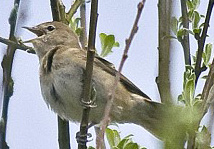 REPORT
/ INTERNATIONAL NEWS REPORT
/ INTERNATIONAL NEWS
|
|
Previous Article | Next Article
Bird brain!
Memory helps migration
Source: Toxics Alert, Date: , 2009
Studies by ornithologists show fewer birds are returning to their breeding grounds every year because of poisoning by pesticides, habitat loss resulting from destructive agriculture, and other human pressures.
While this is a cause for major concern amongst scientists few other interesting facts came to light while they were tracking migration of these birds.
It seems that having a good memory would not only help you remember all your algebra formulae well. If new studies published in the Proceedings of the National Academy of Science are to be believed it is sharp long-term memory that aids migratory birds to return to the same wintering breeding sites each site each year.
Migration is not easy.The hazards include exhaustion, starvation, or simply getting lost.Despite this, an estimated 50 billion birds manage to return to the same wintering and breeding sites every year. Some, like the Arctic tern, have covered 10,000 kilometers (6,214 miles) or more.Their safe arrival depends on accurate navigation. There are various ways in which birds accomplish this.
Some of these birds, for example, can set their compass to the planetary bodies such as sun, moon, or stars. They are also guided by the Earth's magnetic field. Some even home in on their destination using a finely tuned sense of smell. Increasingly, there is evidence that these navigational aids are replaced in older birds by more complex systems. These depend on seasoned migrants being able to learn from experience. Birds do this by improving their long-term memory to map migration routes.
 In an experiment conducted by the ornithologists it was found that migratory garden warblers are able to memorize and remember a particular feeding site for at least a year. On the other hand, its close relative, the Sardinian warbler, nonmigratory, could not retain this information for more than two weeks. A total of 131 garden and Sardinian warbler chicks were collected from nests—from Germany and Israel respectively—and kept in large aviaries. Specially constructed "experimental rooms" were also made to test the memory of the two species.
The study began by allowing each bird into an experimental room for about 8 hours. The rooms included two compartments, each containing different artificial vegetation to represent two habitat types. Both compartments contained food bowls but these were filled in only one of them—so representing high- and low-quality habitats.This was done during fall as this is the time when the migratory warblers are most likely to collect information for reference during future journeys.
The birds were later reintroduced to the experimental rooms—now both without food—for 20 minutes over various time intervals. These "memory tests" showed that garden warblers, which breed in Europe and winter in Africa, were much better at storing information over long periods.
The researchers say their findings suggest long-term memory can be crucial in guaranteeing successful migration; for instance, by helping birds recall the location of high-quality stopover sites.This could also explain why birds like swallows can navigate their way across thousands of miles, returning to the very same spot every year.
Previous Article | Next Article
|
|


 In an experiment conducted by the ornithologists it was found that migratory garden warblers are able to memorize and remember a particular feeding site for at least a year. On the other hand, its close relative, the Sardinian warbler, nonmigratory, could not retain this information for more than two weeks.
In an experiment conducted by the ornithologists it was found that migratory garden warblers are able to memorize and remember a particular feeding site for at least a year. On the other hand, its close relative, the Sardinian warbler, nonmigratory, could not retain this information for more than two weeks.